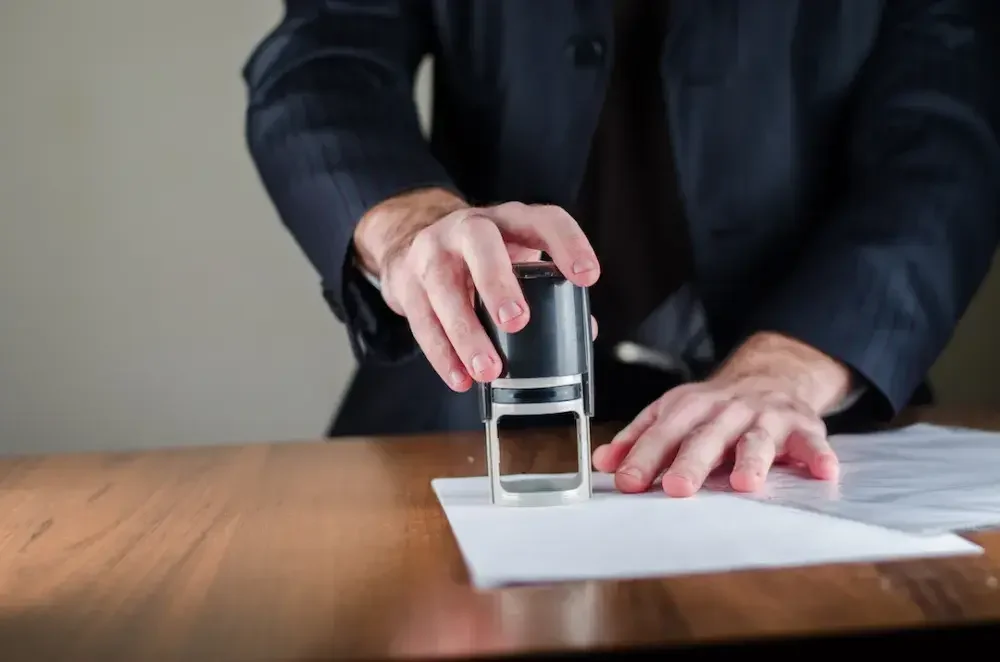
You've probably heard of a document's needing to be notarized, but what exactly does that entail?
What is a notary and what does a notary do?
A notary, also called a notary public, is a public official who certifies the authenticity of signatures to important documents. A notary must verify the identity of the person signing the document, who must do so under his or her own free will.
A notary also may have to administer an oath, if required by the document, and make sure all the identifying details (name, address, etc.) in the document are correct. In some states, a notary may have the authority to certify copies and even be a wedding officiant in states such as Florida, Maine, and South Carolina.
Overall, a notary's role is to help combat fraud or identity theft that could arise during such transactions and to give all parties assurances that the documents have been executed properly.
Why do you need a notary?
You may need a notary to certify that the signatures on documents such as deeds, transfers of sale, mortgages, and other contracts are legitimate and, therefore, legally binding.
Who can be a notary?
Each state has its own procedures for certifying notaries, but generally anyone 18 or over can apply to be a notary by filling out a form and paying a fee. Criminal background checks, training, and/or an exam may be required.
In some countries, a notary must be an attorney, but this is not the case in the United States.
How do you find a nottary?
There are several online notary directories categorized by location, so a search for “notary" and your town or area should do it.
Offline, common places you may find notaries during regular business hours include:
- Banks, credit unions, and other financial institutions
- Insurance agencies
- Local courthouse, police station, or city hall
- Public libraries
- AAA branches (for members)
- Shipping companies, such as UPS
- Your place of business
- College campuses
- Military bases
- Hotel business centers
While some of the places listed above offer free services, not all do, so be aware that you may have to pay a fee.
What if you're traveling abroad?
Notary services can be a little trickier to find abroad, especially if there is a language barrier but, aside from doing online searches, you have some options to explore:
- U.S. embassies and consulates
- Local courthouse, police station, or city hall
- Military bases
- Hotel business centers
- Private attorneys
Before going to the expense of hiring a notary abroad, though, you should first make sure the notarization will be accepted wherever you plan on submitting the document.
How much does a notary typically cost?
Notary fees vary, but the maximum amount a notary may charge per signature is restricted by state law. Usually, fees will range anywhere from $2 to $50 for the first signature, with the average fee falling in the middle. Additional signatures may be offered at a discounted rate.
How should you prepare for your appointment with a notary?
Go to the notary armed with the document that needs to be notarized and at least one form of photo identification. Sometimes a notary must witness the person signing the document, whereas, in other situations, the person may sign ahead of time. When in doubt, wait until you are in the presence of the notary before signing.
Always check with the notary before going, though, to determine any other requirements and make sure you arrive prepared.
Do all parties have to be present at the same place and time for a document to be notarized?
Usually not, but it is best to ask your selected notary regarding the proper procedures in your state.
Are there any warning signs that you should not trust a particular notary?
Nearly all states forbid “virtual notarization"—that is, notarization that is not conducted in person—so you should be cautious about anyone offering to perform a notarization online unless you are sure your state will accept it.
Also, notaries who are not licensed attorneys cannot offer their customers legal advice. Any notary offering you advice on your specific legal issue is breaking the law.
What do you do after documents are notarized?
Once a notarized document is stamped with the notary's official seal, you can then deliver it wherever it needs to go.

